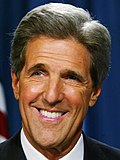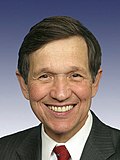
The 2008 United States presidential election was the 56th quadrennial presidential election, held on Tuesday, November 4, 2008. The Democratic ticket of Barack Obama, the junior senator from Illinois, and Joe Biden, the senior senator from Delaware, defeated the Republican ticket of John McCain, the senior senator from Arizona, and Sarah Palin, the governor of Alaska. Obama became the first African American to be elected to the presidency. This was the first election since 1952 in which neither the incumbent president nor vice president was on the ballot, as well as the first election since 1928 in which neither ran for the nomination.

Super Tuesday is the United States presidential primary election day in February or March when the greatest number of U.S. states hold primary elections and caucuses. Approximately one-third of all delegates to the presidential nominating conventions can be won on Super Tuesday, more than on any other day. The results on Super Tuesday are therefore a strong indicator of the likely eventual presidential nominee of each political party.

Mini-Tuesday was the name given to the February 3, 2004 U.S. presidential primary where several states, which to that point had participated in "Super Tuesday," cast their votes for the Presidential nominees of the 2004 Presidential election. Mini-Tuesday was also called Super Tuesday I. With the large number of states moving their election dates up to Mini-Tuesday for the 2008 election cycle, pundits have largely shied away from using the term again, instead choosing to reappropriate the term "Super Tuesday" to better represent the primaries held on that approximate date. The date is also known as "Super Duper Tuesday," "Giga Tuesday," and "Tsunami Tuesday," among others, with the term "Mini Tuesday" falling to apparent disuse for the time being.

The 2004 United States presidential election in South Carolina took place on November 2, 2004, as part of the 2004 United States presidential election which took place throughout all 50 states and D.C. Voters chose eight representatives, or electors to the Electoral College, who voted for president and vice president.

The 2008 South Carolina Republican presidential primary was held on January 19, with 24 delegates at stake. The Republican National Committee took half of South Carolina's 47 delegates away from them because the state committee moved its Republican primary before February 5. It was held on the same day as the Nevada Republican caucuses, 2008.

Super Tuesday II, 2008 is the name, for 4 March 2008 the day on which the second largest simultaneous number of state presidential primary elections was held for the 2008 presidential election cycle. On this day, Mike Huckabee withdrew from the race when John McCain won enough delegates to claim the Republican nomination for president. It was the second Super Tuesday election of 2008 and took place approximately one month after the first Super Tuesday of this election. The Democratic primaries saw 444 delegates selected on this date, with 265 delegates in the Republican primaries.

The 2004 Oklahoma Democratic presidential primary, part of the process of selecting that party's nominee for President of the United States, took place on February 3, one of the seven nominating contests of 2004's "Mini-Tuesday". The primary election chose 40 pledged delegates to represent Oklahoma at the 2004 Democratic National Convention. The remainder of Oklahoma's 47 delegates consisted of unpledged superdelegates not bound by the results of the primary. The election was a closed primary, meaning that only registered Democrats could vote in this election. Wesley Clark won the primary by a razor-thin margin over John Edwards.

The 2012 United States presidential election in North Carolina took place on November 6, 2012, as part of the 2012 general election in which all 50 states plus the District of Columbia participated. North Carolina voters chose 15 electors to represent them in the Electoral College via a popular vote pitting incumbent Democratic President Barack Obama and his running mate, Vice President Joe Biden, against Republican challenger and former Massachusetts Governor Mitt Romney and his running mate, U.S. Representative Paul Ryan.
The following is a timeline of major events leading up to, during, and after the 2016 United States presidential election. The election was the 58th quadrennial United States presidential election, held on November 8, 2016. The presidential primaries and caucuses were held between February 1 and June 14, 2016, staggered among the 50 states, Washington, D.C., and U.S. territories. The U.S. Congress certified the electoral result on January 6, 2017, and the new president and vice president were inaugurated on January 20, 2017.
This article includes the entire 2016 Democratic Party presidential primary schedule in a format that includes result tabulation. Below are the vote totals for everyone that appeared on the ballot during the 2016 Democratic presidential primaries. Two candidates, Bernie Sanders and Hillary Clinton, appeared on all 57 ballots. Two others, Martin O'Malley and Rocky De La Fuente, appeared in over 30 states and six others appeared on between two and ten states. Nearly 20 appeared on only New Hampshire's ballot. As of June 8, Hillary Clinton was considered the presumptive nominee according to media organizations. On July 26, the second day of the Democratic National Convention, Clinton was confirmed the Democratic nominee for the 2016 United States presidential election.

The 2016 United States presidential election in North Carolina held on Tuesday, November 8, 2016, as part of the 2016 United States presidential election in which all 50 states plus the District of Columbia participated. North Carolina voters chose electors to represent them in the Electoral College via a popular vote, pitting the Republican Party's nominee, businessman Donald Trump, and running mate Indiana Governor Mike Pence against Democratic Party nominee, former Secretary of State Hillary Clinton, and her running mate Virginia Senator Tim Kaine. North Carolina had 15 electoral votes in the Electoral College.

The 1960 United States presidential election in North Carolina took place on November 8, 1960, as part of the 1960 United States presidential election. North Carolina voters chose 14 representatives, or electors, to the Electoral College, who voted for president and vice president.

The 1944 United States presidential election in North Carolina took place on November 7, 1944, as part of the 1944 United States presidential election. North Carolina voters chose 14 representatives, or electors, to the Electoral College, who voted for president and vice president.

The 1940 United States presidential election in North Carolina took place on November 5, 1940, as part of the 1940 United States presidential election. North Carolina voters chose 13 representatives, or electors, to the Electoral College, who voted for president and vice president.

The 2020 United States presidential election in South Carolina was held on Tuesday, November 3, 2020, as part of the 2020 United States presidential election in which all 50 states plus the District of Columbia participated. South Carolina voters chose electors to represent them in the Electoral College via a popular vote, pitting the Republican nominee, incumbent President Donald J. Trump, and running mate Vice President Michael R. Pence against Democratic nominee, former Vice President Joe Biden, and his running mate California Senator Kamala Harris. South Carolina has nine electoral votes in the Electoral College.

The 2020 United States presidential election in North Carolina was held on Tuesday, November 3, 2020, as part of the 2020 United States presidential election in which all 50 states plus the District of Columbia participated. North Carolina voters chose electors to represent them in the Electoral College via a popular vote. The state was narrowly won by the Republican Party's nominee, incumbent President Donald Trump of Florida, and running mate Vice President Mike Pence of Indiana, against Democratic Party nominee, former Vice President Joe Biden of Delaware, and his running mate California Senator Kamala Harris. North Carolina had 15 electoral votes in the Electoral College.

The 1924 United States presidential election in North Carolina took place on November 4, 1924, as part of the 1924 United States presidential election, which was held throughout all contemporary forty-eight states. Voters chose twelve representatives, or electors to the Electoral College, who voted for president and vice president.

The 1916 United States presidential election in North Carolina took place on November 7, 1916, as part of the 1916 United States presidential election, which was held throughout all contemporary forty-eight states. Voters chose twelve representatives, or electors to the Electoral College, who voted for president and vice president.

















